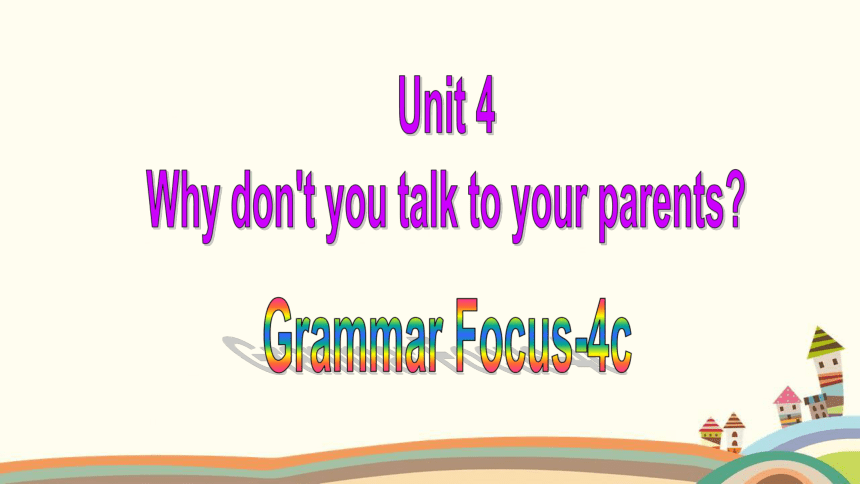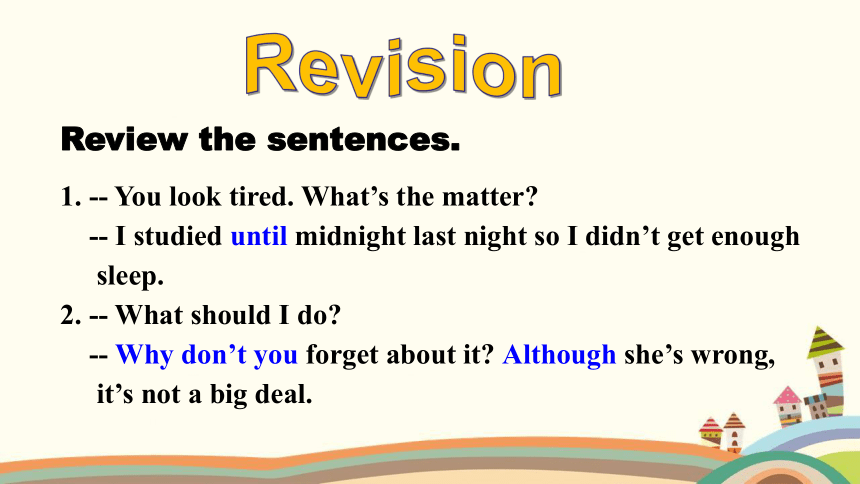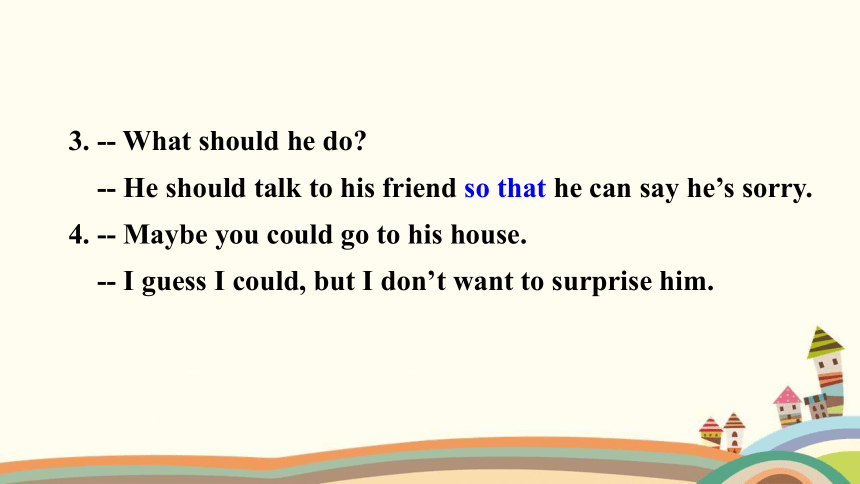Unit 4 Why don't you talk to your parents? Grammar Focus-4c 课件 (共29张PPT)
文档属性
| 名称 | Unit 4 Why don't you talk to your parents? Grammar Focus-4c 课件 (共29张PPT) |  | |
| 格式 | ppt | ||
| 文件大小 | 504.0KB | ||
| 资源类型 | 教案 | ||
| 版本资源 | 人教新目标(Go for it)版 | ||
| 科目 | 英语 | ||
| 更新时间 | 2022-04-09 12:36:15 | ||
图片预览









文档简介
(共29张PPT)
Review the sentences.
1. -- You look tired. What’s the matter
-- I studied until midnight last night so I didn’t get enough sleep.
2. -- What should I do
-- Why don’t you forget about it Although she’s wrong, it’s not a big deal.
3. -- What should he do
-- He should talk to his friend so that he can say he’s sorry.
4. -- Maybe you could go to his house.
-- I guess I could, but I don’t want to surprise him.
“why don’t you … ”
Why don’t you+动词原形+其他成分?
= Why not + 动词原形+其他成分?
表示提建议。
Why don’t you go shopping 你为什么不去购物呢?
Why don’t you join us 为什么不加入我们呢?
提建议的表达方法
在英语中,我们可以用多种表达方式提出我们的建议或征求对方的意见。大多语气比较委婉,显得客气而有礼貌。
A.主语是第一人称 I 或 we,可以用“Shall I … ”或“Shall we … ”引起疑问句以表示建议并征求对方意见。如:
今天下午我们游泳好吗?
Shall we go swimming this afternoon
我明天下午来见你可以吗?
Shall I come and meet you tomorrow afternoon
B.可以用“Let’s do …”来提出建议,let后面的宾语如果是代词,应用宾格,后面接不定式省略“to”。如:
Let’s go for a walk after supper, shall we
我们晚饭后去散散步吧,好吗?
Let’s make it a little earlier, OK
我们就早一点吧,好吗?
C. 可以用“What about / How about … ”来提出建议,about后可接名词或动词-ing形式。如:
What about / How about a drink
喝一杯怎样?
What about writing back to him about it
要不就这件事给他回一封信怎样?
D. 可以用“Why not … ”来提出建议,表示“何不……?”,not后面接动词原形。
Why not … 实际是Why don't we / you … 的简略形式。如:
Why not meet at the school gate at eight
何不在八点的时候在校门口集合?
Why don’t we stay here another day
我们为什么不在这儿再待一天呢?
E. 可以用Would you like … 来提出建议,意思是“你想要吗 ”,
would like后可接名词或不定式。如:
Would you like a cup of coffee
你想来杯咖啡吗?
Would you like to play with me
你愿意和我一起玩吗?
如果我们要说“去散散步,好吗?”,英语有几种表达方式
Let’s go for a walk, shall we
What about going for a walk
How about going for a walk
Why not go for a walk
Would you like to go for a walk
What do you think of going for a walk
“although / though”
although的意思是 “尽管,虽然”,用来引导让步状语从句,在一般情况下可以和though互换,但though比较口语化,而although较为正式,另外although的语气比though重。当although / though引导的从句放在句首时,主从句之间要用逗号隔开。
Although I gave him some advice, he didn’t take them.
虽然我给了他一些建议,但他没有采纳。
Although it’s raining, they are still working in the field.
虽然在下雨,但他们仍在地里干活。
Though he tried hard, he was not successful.
虽然他尽力而为,但他没有成功。
Although / Though he was tired, he kept on working.
虽然他已经累了,但仍然继续工作。
注意:although和though都不能和but在一个句子里连用。
“so that” ﹠ “so… that…”
so that 用来引导目的状语从句,意思为“以便,为了”, 从句中常用can (could),will (would),may (might)等情态动词。
so ... that ...用来引导结果状语从句。
He got up early this morning so that he could catch the early bus.
今天早上他早起,以便能赶上早班车。
He got up so early this morning that he caught the early bus.
今天早上他起得非常早,这样就赶上了早班车。
翻译下面的句子。
1. 他跑得很快,我们跟不上他。
2. 我们把灯打开,以便看看它是什么。
He ran so quickly that we couldn’t catch up with him.
We turned on the light so that we might see what it was.
until可用作时间连词,用来谈论事情发生的时间。until表示“直到……为止”。用来引导时间状语从句,在句中可以放在主句之前或之后。
“until”
Keep straight on until you get to the church.
一直朝前走就走到教堂了。
The hot weather lasted until September.
炎热的天气持续到九月。
I didn’t wake up until I heard the alarm clock.
直到听到闹钟的铃声我才醒来。
A. 在引导时间状语从句时,适合“主将从现”原则, 即主句如用一般将来时, 从句一般用一般现在时。同步推之,如果主句用过去将来时,从句一般用一般过去时。
[注意]
B. until除了可用作连词,还可用作介词,其后可接名词、代词或动名词。如:
We did not notice this matter until yesterday.
直到昨天我们才注意到这件事。
C. till 与until为同义词, 都可表示“直到……为止”, 但如果要表示“直到……才”, 一般用not ... until结构, 且till引导的时间状语从句通常只能放在主句之后。
直到亲眼所见,她才相信它。
2. 直到她哭了,他才放弃和她吵。
She won’t believe it until she sees it with her own eyes.
He didn’t give up quarrelling with her until she cried.
3. 直到他写完一篇800字的文章,他才停下来休息。
4. 我们一直走到河边为止。
5. 他到十岁才会游泳。
We walked until we got to the riverside.
He couldn’t swim until he was ten.
He didn’t stop to have a rest until he finished writing an 800-word article.
Fill in the blanks with although, so that or until.
4a
1. A: What’s wrong
B: My sister borrows my clothes without asking.
What should I do
A: Well, you could tell her that this makes you angry
________ she’ll ask you next time.
so that
2. A: I don’t have any friends at my new school.
What should I do
B: _________ you don’t have any now, you will soon
make some.
3. A: I’m worried about my school grades.
What’s your advice
B: You shouldn’t wait ______ the last minute to study
for a test.
Although
until
4. A: Mike is my best friend, but he always copies my
homework. What should I do
B: _________ he’s your best friend, you should still tell
him that copying others’ homework is wrong.
Although
Write one piece of advice for each problem. Then compare your advice with your partner’s and decide whether the advice is good or bad.
4b
1. I’m very shy.
Advice: ____________________________________
____________________________________
2. My sister and I fight all the time.
Advice: ____________________________________
____________________________________
____________________________________
Why don’t you join a club at school and make more friends
You could try to do more fun things with her so that you will like each other better and not fight so often.
3. My sister spends all evening on the phone.
Advice: _______________________________________
_______________________________________
_______________________________________
_______________________________________
________________________________________
Maybe you could encourage her to do other things, such as go to a movie with you. If you need to use the phone, maybe you could tell her nicely and say that you need to use the phone for a short while.
4. My cousin borrows my things without returning them.
Advice: ______________________________________
_______________________________________
_______________________________________
_______________________________________
Maybe you should tell him nicely how you feel about it and ask him if you could have your things back when he doesn’t need them anymore.
5. My parents won’t let me have a pet.
Advice: __________________________________________
__________________________________________
__________________________________________
__________________________________________
Perhaps they don’t think you will look after the pet yourself. Why don’t you try convincing them that you will be responsible and take care of the pet yourself
4c
Choose one of the problems and ask your classmates for advice. Decide which classmate has the best advice.
You left your homework at home.
Your best friend is more popular than you.
You are afraid of speaking in front of people.
Your best friend does not trust you any more.
Your parents always argue.
A: My best friend is more popular than me.
I want to be like him. What should I do
B: You could try to be friendlier.
C: You should just be yourself.
Example:
A: I am afraid of speaking in front of people.
What should I do
B: You should practice a lot.
C: You should communicate with others more.
Example:
1. Do the other exercises.
Review the sentences.
1. -- You look tired. What’s the matter
-- I studied until midnight last night so I didn’t get enough sleep.
2. -- What should I do
-- Why don’t you forget about it Although she’s wrong, it’s not a big deal.
3. -- What should he do
-- He should talk to his friend so that he can say he’s sorry.
4. -- Maybe you could go to his house.
-- I guess I could, but I don’t want to surprise him.
“why don’t you … ”
Why don’t you+动词原形+其他成分?
= Why not + 动词原形+其他成分?
表示提建议。
Why don’t you go shopping 你为什么不去购物呢?
Why don’t you join us 为什么不加入我们呢?
提建议的表达方法
在英语中,我们可以用多种表达方式提出我们的建议或征求对方的意见。大多语气比较委婉,显得客气而有礼貌。
A.主语是第一人称 I 或 we,可以用“Shall I … ”或“Shall we … ”引起疑问句以表示建议并征求对方意见。如:
今天下午我们游泳好吗?
Shall we go swimming this afternoon
我明天下午来见你可以吗?
Shall I come and meet you tomorrow afternoon
B.可以用“Let’s do …”来提出建议,let后面的宾语如果是代词,应用宾格,后面接不定式省略“to”。如:
Let’s go for a walk after supper, shall we
我们晚饭后去散散步吧,好吗?
Let’s make it a little earlier, OK
我们就早一点吧,好吗?
C. 可以用“What about / How about … ”来提出建议,about后可接名词或动词-ing形式。如:
What about / How about a drink
喝一杯怎样?
What about writing back to him about it
要不就这件事给他回一封信怎样?
D. 可以用“Why not … ”来提出建议,表示“何不……?”,not后面接动词原形。
Why not … 实际是Why don't we / you … 的简略形式。如:
Why not meet at the school gate at eight
何不在八点的时候在校门口集合?
Why don’t we stay here another day
我们为什么不在这儿再待一天呢?
E. 可以用Would you like … 来提出建议,意思是“你想要吗 ”,
would like后可接名词或不定式。如:
Would you like a cup of coffee
你想来杯咖啡吗?
Would you like to play with me
你愿意和我一起玩吗?
如果我们要说“去散散步,好吗?”,英语有几种表达方式
Let’s go for a walk, shall we
What about going for a walk
How about going for a walk
Why not go for a walk
Would you like to go for a walk
What do you think of going for a walk
“although / though”
although的意思是 “尽管,虽然”,用来引导让步状语从句,在一般情况下可以和though互换,但though比较口语化,而although较为正式,另外although的语气比though重。当although / though引导的从句放在句首时,主从句之间要用逗号隔开。
Although I gave him some advice, he didn’t take them.
虽然我给了他一些建议,但他没有采纳。
Although it’s raining, they are still working in the field.
虽然在下雨,但他们仍在地里干活。
Though he tried hard, he was not successful.
虽然他尽力而为,但他没有成功。
Although / Though he was tired, he kept on working.
虽然他已经累了,但仍然继续工作。
注意:although和though都不能和but在一个句子里连用。
“so that” ﹠ “so… that…”
so that 用来引导目的状语从句,意思为“以便,为了”, 从句中常用can (could),will (would),may (might)等情态动词。
so ... that ...用来引导结果状语从句。
He got up early this morning so that he could catch the early bus.
今天早上他早起,以便能赶上早班车。
He got up so early this morning that he caught the early bus.
今天早上他起得非常早,这样就赶上了早班车。
翻译下面的句子。
1. 他跑得很快,我们跟不上他。
2. 我们把灯打开,以便看看它是什么。
He ran so quickly that we couldn’t catch up with him.
We turned on the light so that we might see what it was.
until可用作时间连词,用来谈论事情发生的时间。until表示“直到……为止”。用来引导时间状语从句,在句中可以放在主句之前或之后。
“until”
Keep straight on until you get to the church.
一直朝前走就走到教堂了。
The hot weather lasted until September.
炎热的天气持续到九月。
I didn’t wake up until I heard the alarm clock.
直到听到闹钟的铃声我才醒来。
A. 在引导时间状语从句时,适合“主将从现”原则, 即主句如用一般将来时, 从句一般用一般现在时。同步推之,如果主句用过去将来时,从句一般用一般过去时。
[注意]
B. until除了可用作连词,还可用作介词,其后可接名词、代词或动名词。如:
We did not notice this matter until yesterday.
直到昨天我们才注意到这件事。
C. till 与until为同义词, 都可表示“直到……为止”, 但如果要表示“直到……才”, 一般用not ... until结构, 且till引导的时间状语从句通常只能放在主句之后。
直到亲眼所见,她才相信它。
2. 直到她哭了,他才放弃和她吵。
She won’t believe it until she sees it with her own eyes.
He didn’t give up quarrelling with her until she cried.
3. 直到他写完一篇800字的文章,他才停下来休息。
4. 我们一直走到河边为止。
5. 他到十岁才会游泳。
We walked until we got to the riverside.
He couldn’t swim until he was ten.
He didn’t stop to have a rest until he finished writing an 800-word article.
Fill in the blanks with although, so that or until.
4a
1. A: What’s wrong
B: My sister borrows my clothes without asking.
What should I do
A: Well, you could tell her that this makes you angry
________ she’ll ask you next time.
so that
2. A: I don’t have any friends at my new school.
What should I do
B: _________ you don’t have any now, you will soon
make some.
3. A: I’m worried about my school grades.
What’s your advice
B: You shouldn’t wait ______ the last minute to study
for a test.
Although
until
4. A: Mike is my best friend, but he always copies my
homework. What should I do
B: _________ he’s your best friend, you should still tell
him that copying others’ homework is wrong.
Although
Write one piece of advice for each problem. Then compare your advice with your partner’s and decide whether the advice is good or bad.
4b
1. I’m very shy.
Advice: ____________________________________
____________________________________
2. My sister and I fight all the time.
Advice: ____________________________________
____________________________________
____________________________________
Why don’t you join a club at school and make more friends
You could try to do more fun things with her so that you will like each other better and not fight so often.
3. My sister spends all evening on the phone.
Advice: _______________________________________
_______________________________________
_______________________________________
_______________________________________
________________________________________
Maybe you could encourage her to do other things, such as go to a movie with you. If you need to use the phone, maybe you could tell her nicely and say that you need to use the phone for a short while.
4. My cousin borrows my things without returning them.
Advice: ______________________________________
_______________________________________
_______________________________________
_______________________________________
Maybe you should tell him nicely how you feel about it and ask him if you could have your things back when he doesn’t need them anymore.
5. My parents won’t let me have a pet.
Advice: __________________________________________
__________________________________________
__________________________________________
__________________________________________
Perhaps they don’t think you will look after the pet yourself. Why don’t you try convincing them that you will be responsible and take care of the pet yourself
4c
Choose one of the problems and ask your classmates for advice. Decide which classmate has the best advice.
You left your homework at home.
Your best friend is more popular than you.
You are afraid of speaking in front of people.
Your best friend does not trust you any more.
Your parents always argue.
A: My best friend is more popular than me.
I want to be like him. What should I do
B: You could try to be friendlier.
C: You should just be yourself.
Example:
A: I am afraid of speaking in front of people.
What should I do
B: You should practice a lot.
C: You should communicate with others more.
Example:
1. Do the other exercises.
同课章节目录
- Unit 1 What's the matter?
- Section A
- Section B
- Unit 2 I'll help to clean up the city parks.
- Section A
- Section B
- Unit 3 Could you please clean your room?
- Section A
- Section B
- Unit 4 Why don't you talk to your parents?
- Section A
- Section B
- Unit 5 What were you doing when the rainstorm came
- Section A
- Section B
- Review of Units 1-5
- Unit 6 An old man tried to move the mountains.
- Section A
- Section B
- Unit 7 What's the highest mountain in the world?
- Section A
- Section B
- Unit 8 Have you read Treasure Island yet?
- Section A
- Section B
- Unit 9 Have you ever been to a museum?
- Section A
- Section B
- Unit 10 I've had this bike for three years.
- Section A
- Section B
